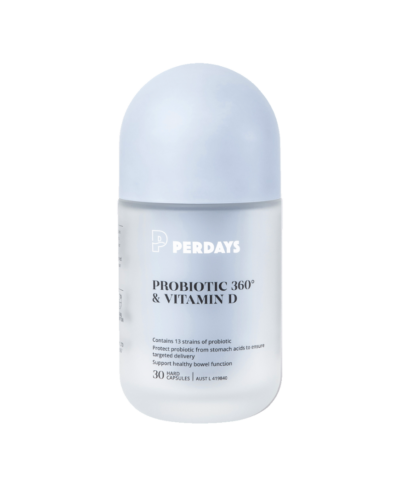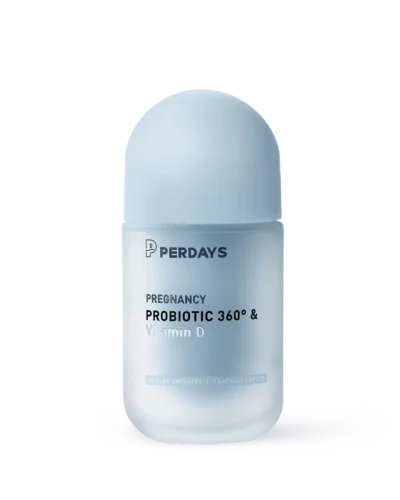Probiotics - Are They beneficial During Pregnancy? Essential Questions Answered
By Perdays Team
Probiotics in a Nutshell
- Gut health and gut microbiome are important during pregnancy.
- Probiotics are live microbes that can be beneficial to our health and can be found naturally in fermented foods.
- Prebiotics are different from probiotics and help nurture the growth of desirable microbes in the large intestine.
- Supporting a healthy gut microbiome during pregnancy can be achieved through diet, incorporating a variety of plant foods.
- Taking a pregnancy-specific probiotic during the second and third trimesters can support digestive health, vaginal microbiota, and reduce the risk of eczema in infants.
Probiotics - Are They beneficial During Pregnancy?
It is undeniable, the health of our gut has never been more of a focus than now. And for good reason, after all the bacteria and other microbes that live in our large intestine in particular can out number our own cells and influence not only our digestion, but many other aspects of our health too.
And pregnancy is no exception. Pregnancy is the perfect time to be focusing on optimising your gut health and gut microbiome, and a pregnancy probiotic may be helpful for both you and your baby.
But, first of all what are probiotics?
Probiotics are live microbes – tiny living things – that are intended to be beneficial to our health. After all, not all bacteria are harmful and cause disease, many aid our body’s functions including the process of digestion and producing vitamins.
Probiotics are found naturally in many foods that are fermented including yoghurt, kefir, sauerkraut or kimchi (pickled and fermented cabbage) and kombucha.
Probiotic supplements are when similar or identical microbes that are found in our bodies is prepared as a capsule or powder to provide a specific health benefit or range of health benefits. This could include a single strain or a range of strains of bacteria and/or yeasts within the probiotic formulation, depending on its purpose.
For example, a probiotic designed to help support pregnancy will be formulated differently to a probiotic supporting general health and well-being.
What’s the difference between prebiotics and probiotics?
A prebiotic, sounds a lot like a probiotic, but they are in fact completely different.
Think of probiotics as the plants in your garden, and prebiotics as the fertiliser added to the soil. Prebiotics help nurture the growth or activity of desirable microbes within our body.
Prebiotics are generally indigestible and end up in the large intestine where they fuel the growth of the microbes that reside there. Prebiotics can include certain foods that are rich in prebiotic fibre, however, research is beginning to review the impact that certain antioxidants like polyphenols found in dark chocolate and red wine, can also function as prebiotics despite not being fibre at all! (Alves-Santos et al., 2020)
Some examples of foods rich in prebiotics include:
- Jerusalem artichoke
- Chicory
- Garlic
- Onion
- Peas
- Corn
- Legumes and beans including chickpeas, lentils, baked beans, kidney beans
- Stonefruit like peaches & nectarines
- Watermelon
- Pomegranate
- Rye bread & crackers
- Pasta
- Barley
- Cous cous
- Oats
- Cashews
- Pistachios
Breast milk also contains its own prebiotic profile! (Monash University)
How can I support a healthy gut microbiome during pregnancy?
Supporting a healthy gut microbiome during pregnancy can be achieved through your diet, although, there are other factors such as medications (such as antibiotics), sleep, physical activity, stress and environmental factors that can also play a role.
The best way to support a healthy and diverse gut microbiome, which has been consistently linked with optimal general health and well-being with leading researchers in gut health, is to incorporate a broad variety of plant foods in your diet every day.
A great target that is backed by research is to aim for 30 different plants per week based on the work carried out in The American Gut Project. This research showed that those who included 30 or more different types of plants in their diet each and every week had a more diverse gut microbiome than those who included 10 or less. More diverse gut microbiome means a healthier body and even a healthier mind too!
So, what counts as a plant food?
- Any type of fruit
- Any type of vegetable
- Any type of wholegrain bread or cereal product like brown rice, quinoa, grainy crackers, cous cous, barley
- All herbs and spices
- All nuts & seeds
- All types of legumes and beans like chickpeas, lentils, baked beans & kidney beans
Now at first, 30 plants per week may sound really quite overwhelming! But it is simpler than you may think!
Here’s a quick swap to help you get the hang of incorporating a wider variety of plant foods in your day. If you typically make your morning porridge with plain oats and water.
Why not try adding in some chia seeds, pepitas and ground flaxseeds, with a dusting of cinnamon, topped with frozen mixed berries containing strawberries, raspberries and blueberries alongside your oats made with water or milk of your choice. This brings your breakfast plant total up from one to nine.
This is way easier said than done in pregnancy though, when nausea, constipation, fatigue and food aversions are at play, so do your best when and where you can.
Incorporating foods that are naturally rich in probiotics like yoghurt and kefir during pregnancy is also a great way to support your gut microbiota. It is generally not recommended to include kombucha or sauerkraut in your pregnancy diet, as there is a small risk that harmful bacteria can grow in the culture during this fermentation process, and it is not yet well understood what exactly lives in the community of bacteria and yeast that is used in each batch of kombucha or sauerkraut.
Speak to your healthcare professional if you need personalised advice on this topic.
What are the benefits of taking a probiotic during pregnancy?
Another way to support a healthy gut microbiome during pregnancy, is to consider starting a pregnancy specific probiotic, particularly in the second and third trimesters. Not only can specific strains help support digestive health and combat some of the less, desirable symptoms of growing a baby like constipation and bloating.
However, there are even more great reasons why you should consider adding a pregnancy probiotic to your day.
Research suggests that optimising the vaginal microbiome, through probiotic strains such as Lactobacillus acidophilus, can help to maintain a healthy acidic pH when supplemented orally during pregnancy may help support the health of the vaginal microbiota! (Expert Opinion Doc, 2020)
In addition, researchers have provided pregnant women with probiotic supplementation, specifically Lactobacillus rhamnosus HN001, in their third trimester until 6 months postpartum whilst breastfeeding, specifically amongst those who have a family history of asthma, allergies, eczema or hayfever. This study showed that supplementing pregnant and breastfeeding mother significantly reduced the risk of baby developing eczema throughout the first 2 years of life, which was maintained until the children in the study turned 10. (Wickens et al., 2018).
Seems like a small win, however, eczema is often one of the early risk factors of developing other allergies, including food allergies which affects 1 in 10 Australian children up to one year of age (ASCIA).
As mentioned earlier, the health and composition of the gut microbiome can impact mental health, this is via the gut-brain axis, a two way “highway” connection between the brain and the gut. Ever felt so nervous that you got that sensation of butterflies in your belly? This is a perfect example of how the gut-brain axis works.
As a lot of your neurotransmitters that a play a role in your mood are created by our gut, it is a natural progression to consider the role of specific microbes and strains of probiotics may help support mood and emotional balance too. With research being carried out showing the link between probiotics and maternal mental health being published in recent years (Slykerman et al., 2017).
It is important to note, that if you are struggling with any mental health concerns, before, during or after pregnancy, that you seek the advice of a health care professional to ensure you remain safe and you prioritise the health of your mind, as well as your physical health.
Speak to your health care professional. Dietary supplements are not designed to replace a balanced diet.
What to look for when selecting a pregnancy probiotic?
Considering adding a pregnancy probiotic to your day?
Here are some top tips of what to look for when it comes selecting a pregnancy probiotic that suits the unique needs of pregnancy and provides the range of benefits mentioned above.
- First you want whichever probiotic you choose to take during pregnancy to be effective. Which means it needs to survive the acidic environment of your stomach first before moving through your approximately 7 metre long small intestine before arriving in your large intestine or colon where it can get to work. A great way to know is if the probiotic has what is known as an enteric coating, which means the outside layer is broken down by stomach acid and the delicate probiotics inside survive and can get to where they need to be. A capsule-in-capsule format is another way that you can ensure the probiotic will end up in the right spot, as the outside layers are broken down in the stomach before heading further down your digestive tract to your bowel.
- Another critical part of being effective, is of course, the formulation. It is important only well-researched strains of probiotics that are known to be helpful in pregnancy are included to benefit both you and your baby during pregnancy. And the amount of each strain is enough to make a difference to your gut microbiome in a positive way!
- Consider a probiotic that also offers some prebiotic additions to support the health of your existing gut microbiota, this may be in the form of inulin, chicory root fibre, green banana or Jerusalem artichoke powder or FOS (fructan-oligosaccharides). Note: the inclusion of these prebiotic ingredients make these products high in FODMAPs which may affect some sensitive individuals.
- Temperature and storage – most modern probiotics don’t need to be stored in the refrigerator for the bacteria remain stable and alive inside the capsule. Plus, it is much easier to remember to take it each day when it’s not hiding in the depths of the refrigerator! It is important that the probiotics are stored at the recommended temperature to ensure they remain most effective.
Speak to your health care professional if you are considering starting a new supplement to ensure it is right for you.
Perdays Pregnancy Probiotic 360º
We developed our Pregnancy Probiotic to meet the specific needs of pregnant women. We made sure that every capsule contains 16 billion purposeful bacteria – so you know it’ll work.
No probiotic would be effective without ensuring it is delivered to where it needs to go. That is why we developed Nutriseal-Capsules. These protect the probiotics from stomach acids and ensure targeted delivery to the gut where there is a better chance of survival (and to be effective).
Support Your Pregnancy With Perdays Probiotics
Perdays Probiotic 360° & Vitamin D For improved absorption, our unique patented Nutriseal-Caps™ technology protects our pregnancy probiotics from stomach acids, delivering them to the small intestine.
References
- hhttps://www.allergy.org.au/patients/food-allergy/faqs#:~:text=How%20common%20is%20food%20allergy,and%20approximately%202%25%20of%20adults.ttps://pubmed.ncbi.nlm.nih.gov/28943228/
- https://pubmed.ncbi.nlm.nih.gov/30430649/
- https://www.sciencedirect.com/science/article/pii/S1756464620303935
- https://www.monash.edu/medicine/ccs/gastroenterology/prebiotic/faq#6
- https://pubmed.ncbi.nlm.nih.gov/29795809/


